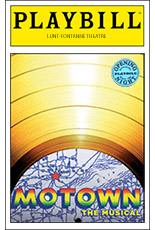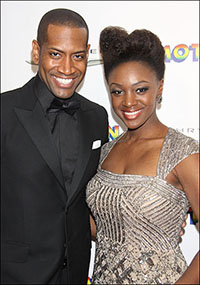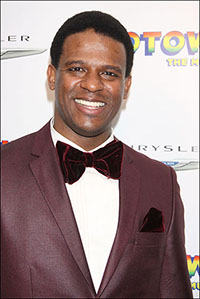
It was 32 years in the coming, but on April 14 at the Lunt-Fontanne, Berry Gordy and Diana Ross finally delivered to Broadway their official company-line rebuttal to Dreamgirls, an admitted fiction that played fast 'n' loose with the facts and fantasies of The Supremes split-up. It was called Motown, and, true to its brand name, it was one big platter spin, separated by flashes of varnished truth. The credits said it all: "Book by Berry Gordy. Music and Lyrics from The Legendary Motown Catalog."
Making the occasion all the sweeter was the fact that Gordy and Ross sat in the audience, side by side, and watched the story of their lives wash over them in a tuneful tsunami that is a continuing testament to Gordy's eye and ear for talent.
After the curtain call, Gordy joined the jubilation on stage and took a deep and well-deserved bow. "All I wanna do," he said, "is thank you all for sharing this dream."
Surrounding him were real-life figments of his dream factory, who had popped up from the audience and rushed forth to congratulate their former boss. In addition to Ross, an event all by herself, there were Stevie Wonder, Smokey Robinson, Mary Wilson, Gladys Knight, The Commodores, Suzanne de Pass and on and on...
Gordy's dream began with Joe Louis' knockout punch in 1948 that made him champ of the world and proved to eight-year-old Berry what's possible when that dream is connected to drive and determination. Starting out as a songwriter, he found he had an unfailing flair for spotting talent, so he started his own starmaking assembly line in Detroit, manufacturing and marketing what became known as the Motown sound. As soon as stars reached a certain high altitude and felt the restraining tugs of Gordy's strings, they knew they had to leave his nurturing nest—and did by hook, crook or litigation. Even his prize canary, La Ross, left her gilded cage—for $20 mil. It happened time and time again, but in February of 1983 they all came home for one night only—to salute the 25th anniversary of Motown and the man who manipulated them into major-league stardom. The play begins here, with Bitter Berry festering in his den over their ingratitude and rejection. Even special pleading from his steadfast star, Smokey Robinson, can't roust him out of his misery, but, in the manner of an old Warner Bros. biopic, he rallies and attends. Fade out.
Such is The Gospel According to Berry Gordy, and even if you were not paying attention at the time, you'll be amazed at how many of them have stuck to the roof of your mind. They parade in front of you like newfound old friends: "Stop! In the Name of Love," "My Guy," "My Girl," "ABC," "I Hear a Symphony," "Good Morning, Heartache," "I Heard It Through the Grapevine"—57 in all, plus some new ones by Gordy and Michael Lovesmith to advance 25 years of plot.
The Motown class reunion that was forming on stage acquired a new cluster of members when the show adjourned to Roseland and they had time and space to talk. Ross, ever the skittish diva, put in a fast token appearance and then vanished, leaving the spotlight to Gordy, who remained a celebrity port of call all evening.
Clearly, lead producer Kevin McCollum was pleased at what he had wrought. "About three years ago, Berry and I had a conversation," he recalled. "He wanted to bring his story to Broadway. I said, 'What story do you want to tell? There's a lot of ways to tell it.' He said, 'The reality is we really were a family. Yes, there was a lot of conflict, but there was also a lot of love, and I want to show the love that was there. Like every family, we fought—but that's also why we make great music together.'"
"I believe that musicals start with an earthy problem from an individual, and then to become a musical it transcends because it's really about trying to find your family. I felt that this Motown story was the perfect structure for a musical. So I said 'Yes.'"
The result, in the view of Smokey Robinson (the real one), looked like that love was here to stay for quite a spell on Broadway. "It was a fantastic show," he said. "I think it's going to be one of those things that go on for years. It really brought tears to my eyes—to remember those times and see what we did back in the '60s."
Charl Brown admitted it was more than a little intimidating to play Robinson when the real one was out front "but wonderful at the same time. Apparently, he liked it. We just wanted to honor these legends who came before. Smokey is one of a kind. I had to research him—his voice and his singing—and it was great to get to do that." Pressure began for Brandon Victor Dixon the day he agreed to play the Gordy-scripted Gordy. "I like that I get to show people another side of Berry Gordy and really communicate to them the love of Berry and his Motown family," he said.
"The events of his life are not extraordinary things to Berry. They're just the truth, and Berry said, 'We want to tell the truth, man, so go out there and tell the truth.'"

Buy this Limited Collector's Edition |
Having Diana Ross in attendance didn't phase Valisia Lekae at all—"Every night I tell myself she's in the audience"—and it definitely didn't affect her performance of her, which has a diva-like edge to it with independence, temperament and sass.
"All the choices I made in my portrayal of her was based on a lot of research I did. I wanted to present her as honestly as I could." It certainly goes down well with the crowd. "They do that every night. We've had the pleasure of really great audiences."
Another fave with the audience was Bryan Terrell Clark's Marvin Gaye. "I was really, really surprised," he remarked about their enthusiasm. "When you're working in rehearsals, you're kinda in a bubble—and I'm one of those actors who get extremely focused on the work, and so I had no idea how the audience was going to respond, but, from the first preview to tonight, audiences have received what I had in my heart.
"As an actor, I deliberately tried my best not to do an imitation—it's just not my taste in art. For some people, that might be great, but I just wanted to bring the essence of who he was. Of course, I studied him. There are certain gestures, certain physical postures to any character work, but imitating him was never my objective." In Gaye's final scene, he asks Gordy to drop the surrogate-father act. "I got a dad!" he tells him in an exit line that has a decided chill. (The day before his 45th birthday, the singer was shot by his father with a gun he had given him as a Christmas present.) "When I first read that line, I almost dropped my script," Clark said.
"It's kinda surreal meeting a woman who's very much alive, very much still in the business doing her thing," Ariana Debose said about Mary Wilson. "To portray her legacy eight times a week—thus far, it's been amazing—so to pay tribute to her tonight, with her in the audience, was really wonderful. I did know she was here. It was a little nerve-racking, but nothing we couldn't handle. At least I had Mary Wilson. Valisia had Diana Ross—but both of them are fabulous women."
 |
||
| Bryan Terrell Clark and Saycon Sengbloh |
||
| Photo by Joseph Marzullo/WENN |
"Being able to play Mary Wells and what she represents—her legacy, especially since she is no longer with us—is probably the most important thing for me to do every night. I get people all the time who come up to me after the show say they knew her very, very well—someone who was connected to her in some way—you never know who's going to be in the audience, so you always have to do your best."
Michael Arnold, who won the Astaire Award 12 years for his hoofing in 42nd Street, sits this one out as a character actor and runs through an assortment of wigs before he gets down to his shaved pate. "I let all the kids dance now. I get to take a break."
Before the curtain up, Arnold received the Gypsy Robe for the first time. (It goes to the person in the show with the most Broadway shows.) "This show is my lucky 13."
Three of The Commodores were present and very pleased with what they saw—William "Wak" King, J.D. Nicholas and Walter Orange. The latter was super-charged. "New York was on fire!" he exclaimed. Suzanne de Passe liked the way Andrea Dora presented her: "It's not that she should be me. She should have fun with what she's given to play. It's impossible to tell the whole story in depth, but I think that what Berry accomplished was that he gave us pieces that did absolutely portray the essence of what was going on at the time."
Did Eric LaJuan Summers have fun on opening night? "Are you kidding me? You're putting a kid in a candy store! I was Jackie Wilson. I was Rick James. I was Billy Gordon of The Contours, one of The Jackson Five, a Four Top and Brian Holland!"
 |
||
| Ryan Shaw |
||
| Photo by Joseph Marzullo/WENN |
The grown-up Stevie Wonder is played by Ryan Shaw, who met his counterpart three days ago. "It was awesome. When Stevie gave me his blessing, the pressure was off."
A sparkplug fireball named Raymond Luke Jr. put over the young Stevie Wonder, and the young Michael Jackson.
You'll find no mention of him in the Playbill, but Gordy's secret script consultant was Dick Scanlon. "I worked with Berry on helping him shape the story he wanted to tell in the way that it could be told in two hours and 40 minutes on the stage," he explained. "I gave him whatever information I had about the theatre, and I've been a big Motown fanatic since I was a small child. I walked in really knowing the repertory and the story. I've read many books on it…so I just helped find a way to theatricalize it. He is the most collaborative, generous, hard-working person I've ever worked with. You can be completely honest with him. He only wanted the truth and he wants it to be great on stage. Berry is someone we all should aspire to."
David Korins' sets and Natasha Katz's lighting give this musical cavalcade the sweep of an epic—and costume designer Esosa whipped up 450 costumes and 150 wigs for the outing. "This was like a once-in-a-lifetime experience for any designer," Esosa contended. "Motown was more than just music. Motown was a cultural revolution that included fashion. Motown changed the way people dressed, and I definitely wanted that to be a part of the show. That's my contribution to the show." Producer-director George Schlatter's contribution was to push the Motown sound deeper into the national consciousness via television. "We did the first Diana Ross Motown special in 1968," he remembered, and we have been working with Berry and the group ever since then. That's why tonight is really, really exciting. He's bringing something to Broadway they haven't seen. He changed show business. He changed all the music business. Now, he's going to change Broadway."
Sting returned to the Lunt-Fontanne, the scene of his 1989 Threepenny Opera. The house was further star-stuffed with Nona Hendryx, Glenn Close, Edward Holland Jr., Gayle King, Lamont Dozier, Brian d'Arcy James and Jennifer Prescott, Valerie Simpson, Mary Hart, Mark Kudisch and Shannon Lewis, Melba Moore, Claudette Robinson, Clive Davis, Red Foo, Hunter Bell and Jeff Bowen, Courtney B. Vance, Warren Adams, Norm Lewis, Debbie Allen, Brian Stokes Mitchell and Allyson Tucker, Patricia Wilcox, Rosanna Arquette, La Chanze, Daniel Breaker and Kate Whoriskey, Bono, Kathie Lee Gifford and Hoda Kotb, A.J. Calloway, Jadagrace, Julie Chen and Les Moonves, Lindsay Mendez, Tom Kitt, Jesse Jackson, Epatha Merkerson, Thalia and Tommy Mottola, Jane Fonda and Richard Perry, L.A. Reid, Cuba Godding Jr. and Vanessa Williams, Lesli Margherita, Lucian Grainge, Adriane Lenox, Evander Holyfield, Walter Bobbie, Star Jones, Andrew Keenan-Bolger, Doug Morris, Orfeh and Andy Karl, Christiane Noll and Jamie LaVerdiere, Michael Berresse, Judy Craymer, Howard Stringer, Spike Lee, Vince Oddo and Lauren Lim Jackson.
Deborah Cox arrived late, after her Jekyll and Hyde, identifying herself as a friend of Charles Randolph-Wright, the show's director.
Watch highlights from Motown here!















































































































































































